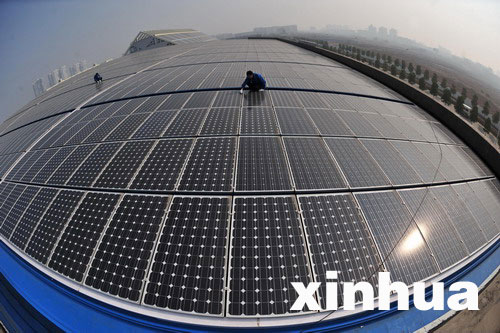China should react to anti-dumping inquiries
- By Han Xiaoping & Chen Xia
 0 Comment(s)
0 Comment(s) Print
Print E-mail China.org.cn, October 3, 2012
E-mail China.org.cn, October 3, 2012
Editor's notes: On Sept. 6, 2012, shortly after the U.S. conducted its anti-dumping and anti-subsidy investigations, the European Commission filed for a similar inquiry into Chinese photovoltaic (PV) products worth a total of 130 billion yuan (US$20 billion). So far, the case is the largest trade dispute that involves China- in terms of trade volume. The nation expects over 400,000 Chinese jobs to be affected by the investigation. During an interview with china.org.cn, Han Xiaoping, deputy secretary-general of China Enterprises Investment Association's Finance Committee, shares following thoughts and views:
|
|
|
On Sept. 6, 2012, shortly after the U.S. conducted its anti-dumping and anti-subsidy investigations, the European Commission filed for a similar inquiry into Chinese photovoltaic (PV) products worth a total of 130 billion yuan (US$20 billion). |
There are underlying reasons for these recent anti-dumping and anti-subsidy investigations.
The U.S. is currently undergoing a new industrial revolution. After the sub-mortgage crisis, the nation began to shift its dependence on the financial sector back to one on a real economy. In the long run, this move is bound to have an impact on China; when the U.S. decides to put its high-tech products on the global market, many countries may abandon Chinese products because they may possibly feel the heat from the world's biggest economic power.
The investigations into Chinese PV products are just a case in point. The real aim of the investigations might be to cause a backlash for China's new energy industry, which seems to show the greatest potentials among China's various manufacturing industries.
However, when the U.S. launched its anti-dumping investigation last October, it didn't trigger any sharp reaction from China, which was actually hoping to solve the dispute through negotiations. When the U.S. went on to impose tariffs up to 250 percent on Chinese products this May, China only lodged a protest. Noticing these reactions, Europe, a major market for Chinese PV products, launched its own investigation. Moreover, India also decided to look into its Chinese products even though these only make up for a small share of the Indian market. All these aforementioned actions show that there is a global tendency to oppose Chinese products.
As far as international trade is concerned, the U.S. will only follow the rules that play in its favor and will never hesitate to violate those that don't .The global market will be deeply shaken if all the other big economic powers decide to follow suit and there would be more trade disputes involving China. Should these circumstances occur, China would have to take retaliatory measures, such as selling off European sovereignty debt and striking the U.S. automobile industry. Only this way can this chain of actions to oppose Chinese products be broken.
The trade dispute, no matter which direction it will go, will lead to a major restructuring in the Chinese PV industry. Chinese enterprises should enhance their R&D and exploit the global market, in particular those of less developed countries, by setting more competitive prices. Additionally, a law on energy use should be in place soon to guide the healthy development of the Chinese PV industry. For the time being though, China must find a way to boost its domestic demand in order to reduce the dependency of its PV business on the foreign market.
Han Xiaoping is deputy secretary-general of China Enterprises Investment Association's Finance Committee.
Opinion articles reflect the views of their authors, not necessarily those of China.org.cn.







Go to Forum >>0 Comment(s)